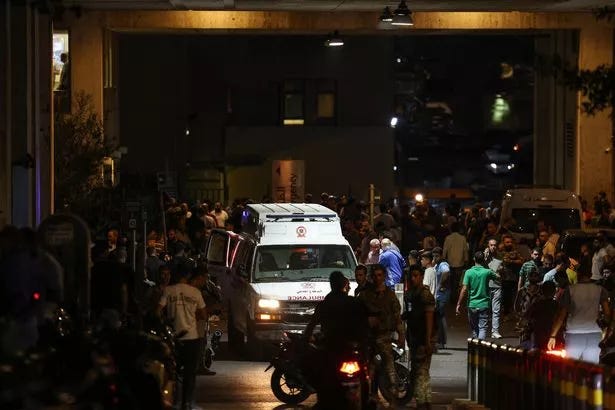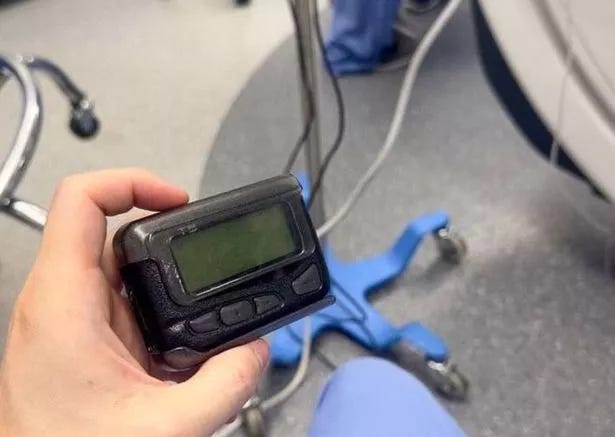Israel suspected of 'turning pagers into weapons to attack Hezbollah' as 2,750 injured and nine killed
As many as 2,750 people were wounded, 200 of them critically, Lebanon’s health minister said
Hi all, thanks for my reading my newsletter over the last 12 months, it’s been an honour to share my reporting with you. I’ve spent the past year filing reports from Ukraine, Israel and just this morning on the deadly attacks across parts of Lebanon and Syria. If you’d like to upgrade to paid to support my work, we’re running a special anniversary offer. You can access it here.

At least nine people were killed and nearly 3,000 injured today after hundreds of pagers exploded across Lebanon and in parts of Syria in an apparent attack.
Hezbollah members and a young girl were among those who died, with Iran’s ambassador also injured, according to reports. As many as 2,750 people have been wounded – 200 of them critically – and eight killed, according to Lebanon’s health minister Firas Abiad. The death toll later rose to nine.
Hundreds of the devices exploded near-simultaneously across Lebanon and parts of Syria, AP reports said. The exploded pagers were newly-acquired by Hezbollah after the group's leader ordered members to stop using mobiles, warning they could be tracked by Israeli intelligence.
A Western Intelligence source claimed the IDF leaked info that the exploded pagers were delivered to Hezbollah three months ago. Amid rising tensions across the Lebanon border, officials pointed the finger at Israel for what seemed to be a sophisticated, remote attack.
The Israeli military declined to comment.
Near-daily clashes between Lebanese militant group Hezbollah – an ally of Hamas – and Israel have been taking place for over 11 months against the backdrop of war in Gaza.
A Hezbollah official told how the new brand of handheld pagers used by the group first heated up before exploding, killing at least two of its members and wounding others. A young girl was reportedly among those killed, according to Hezbollah. Her age was not immediately clear with reports saying she was eight or 10.
Experts said explosions showed signs of being a long-planned operation. Investigators had no immediate word on how the pagers were detonated or if explosives had somehow been sneaked into pagers.
Pictures and videos from Beirut's southern suburbs circulating on social media and in local media showed people lying on the pavement with wounds on their hands or near their trouser pockets. In one case, the BBC reported CCTV appeared to show an explosion in a man’s trouser pocket as he was standing at a shop till.
"We hold the Israeli enemy fully responsible for this criminal aggression that also targeted civilians," Hezbollah said, adding that Israel will "for sure get its just punishment."
Iran’s ambassador, Mojtaba Amani, was superficially wounded by an exploding pager and was being treated at a hospital, Iranian state-run IRNA news agency said. Hezbollah leader Hassan Nasrallah had warned the group's members not to carry mobile phones, saying they could be used by Israel to track their movements and to carry out targeted strikes.
A Western Intelligence source told the Mirror: "Hezbollah fighters are using pagers as a means of fast, safe communication with encrypted messages to replace phones in wartime. Today, pagers were attacked, causing this unprecedented mass casualty event.
“The IDF has leaked that the current pagers that exploded were delivered to Hezbollah just three months ago. Which implies the old safe ones were replaced with compromised new ones in favour of more old-fashioned communication means, including pagers and couriers which deliver verbal messages in person, two of the sources said.
"Hezbollah has also been using a private, fixed-line telecommunications network dating back to the early 2000s.
"This is in case conversations are overheard, code words are used for weapons and meeting sites, according to another source familiar with the group's logistics. These are updated nearly daily and delivered to units via couriers."
It is also believed walkie talkies and even phones may have been compromised with explosives, just a few grams of deadly material needed.
Another intelligence source told the Mirror: "It's a huge blow to Hezbollah as it's likely other systems - such as weapons - have been penetrated and compromised.
"This indicates a very long-term deep penetration operation, inserting an agent into the logistics chain and becoming trusted enough to start re-issuing new communication systems. That asset will be long gone, leaving a corrosive trail of mistrust inside Hezbollah.
“Whatever they had planned for Israel has been hugely disrupted because the whole communications network will have to be rebuilt, weapons systems examined and crucially a lot of people will be under suspicion - a huge coup for Israeli intelligence."
Lebanon's Health Ministry called on all hospitals to be on alert to take in emergency patients and for pager owners to get away from them. It also asked health workers to avoid using wireless devices. Emergency rooms have been overloaded with patients - many of them with injuries to their limbs - and some are in serious condition, AP photographers at area hospitals have said.
Hospitals in southern Lebanon, the eastern Bekaa Valley and Beirut's southern suburbs – all areas where Hezbollah has a strong presence – called on people to donate blood of all types. The state-run National News Agency reported that in Beirut's southern suburbs and other areas "the handheld pagers system was detonated using advanced technology, and dozens of injuries were reported".
A Hezbollah official, who spoke on condition of anonymity, said the explosions were the result of "a security operation that targeted the devices”. "The enemy (Israel) stands behind this security incident," the official said. The new pagers that Hezbollah members were carrying had lithium batteries that apparently exploded, he added.
Lithium batteries, when overheated, can smoke, melt and even catch on fire. The images from Tuesday showed signs of detonation, a weapons expert said.
Alex Plitsas, of the Atlantic Council, said: "A lithium ion battery fire is one thing, but I've never seen one explode like that. It looks like a small explosive charge.”
Another possibility is that an electronic pulse "was sent from afar and burnt the devices and caused their explosion," says Yehoshua Kalisky, a scientist and senior researcher at the Institute for National Security Studies, a Tel Aviv think tank.
"It is not some random action; it was deliberate and known." Israel has killed Hamas militants in the past with booby trapped mobile phones.
Thank you
I hope you’ve enjoyed my latest newsletter. If you have been forwarded this email and would like to sign up, you can do that right here.
Let me know your thoughts in the comments and see you next week,
Chris







